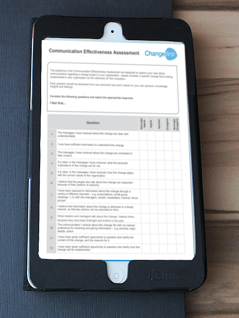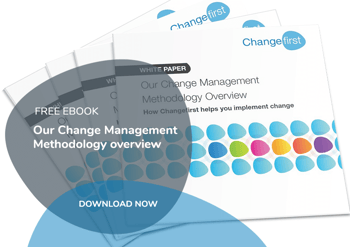Engagement drives successful change management and creating a sense of engagement requires more than just communication. But it does require the right kind of communication.
%20TP.png?width=800&height=400&name=Doyouhaveaneffectivechangecommunication%20(800%20x%20400%20px)%20TP.png)
The favoured methods of many leaders during times of change - an email or a PowerPoint presentation - misses the mark. And getting your change management communication strategy right can mean the difference between success and failure.
We spoke last week about the 4 processes needed to create powerful engagement within your organisation:
- Communication
- Involvement
- Learning
- Recognition
This week we are going to dig a little deeper into communication. Communication is an area that on the surface seems straightforward, but in fact, can be tricky to get right.
Engagement relies on honest communication and trust
Communication is an important element in building the perception of leader effectiveness during major organisational change. What is important with respect to leadership communication is that it is frequent and forthright.
Change communication needs to be connected with people: performance-focused, future, and development oriented. It needs to answer the questions people are asking. Even if the response is “We don’t know”, people appreciate that their concerns are being heard.
The danger of a silent debate
Most organisations tend to invest a lot of time and resources in change communications, but the question is: are they hitting the mark? Do the communications help impacted people, at all levels in the organisation, gain a shared sense of purpose, and clarity on the part they each will play in change?
This question brings to mind an event that is told in Jewish literature, a silent debate, that took place about a century or two ago. The moral of this tale is based on miscommunication and misinterpretation of the message. Each party, although involved in the same “conversation” had a completely different perspective on what was being communicated.
The question for change leaders to ask themselves is, how do I know how my messages are being understood? Have the readers taken the perspective on the situation that I intended? Your carefully crafted messages to inspire engagement within the organisation could very well be missing the mark.
Four ways you can communicate change effectively
At best, most email communications are only skim-read, and PowerPoint slides are skipped over even more quickly. And yet, these are the most common communication tools used by leaders.
Effective communication needs various methods to increase the chance the messages are being received and understood. Based on our experience, we have found that engagement is best created when using these 4 communication actions:
- Use face-to-face, two-way communication wherever possible
- Enable your sponsors to demonstrate a real commitment to communication and be involved in the creation of the communication strategy
- Tailor messages to the receiver’s perspective
- Seek feedback and, where possible, take it on board
(You can read more about each in this article).
Effective communication takes time and involvement. Take note of what is, and what is not working in your organisation. Every organisational culture is different, and it may take you a few tries to get the right mix.
|
Download a free copy of our Commmunication Effectiveness Survey For 15 years Changefirst has collected data and information on what makes effective change communications. Based on this, we have created a Change Management Communication Effectiveness checklist, which our clients use to assess the communication effectiveness for a specific change initiative. Available free to our readers, download the communication effectiveness survey today and get valuable feedback on the effectiveness of your change management communication strategy. |
|
 |




Leave a comment